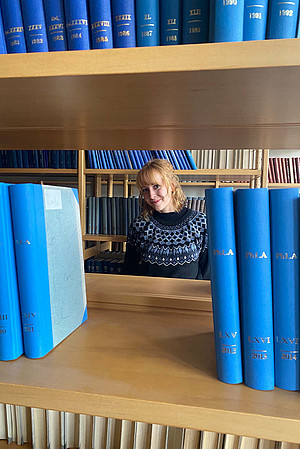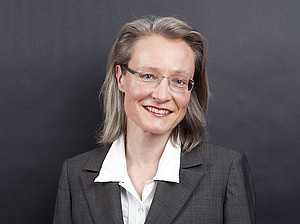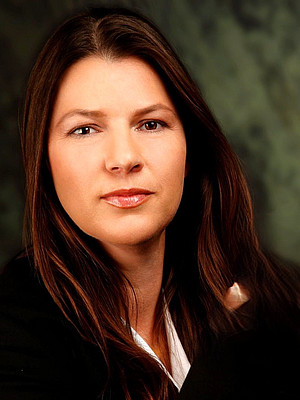Three questions for... Institute members

Marlene Kneidinger
Philosophy student
What exactly are you interested in?
To put it very simply, you could say that I like to think about thinking. More specifically, I am interested in the epistemological question of what access we have to our own mental states, to what extent we can be mistaken in our conscious experience and, if we are mistaken about our conscious mental experiences, for what reasons we are. Other exciting questions are also related to this, for example, such as whether our mental experience can be purely physical.
What fascinates you personally most about your studies? Or what is the value of philosophy for you?
I think I like to ask "why". I just enjoy trying to understand a problem in detail, thinking in different directions and weighing up positions. I also find it fascinating when, at times, the attempts to solve a problem provide more insight into one's own cognitive limitations (or those of human cognition in general). For me, it is valuable to have (more) clarity about what is unclear and for what reasons it is unclear, and to be able to keep asking questions. For me, the value of philosophy lies precisely in the fact that nothing is simply taken for granted, but that the question: "What does that mean?" is central.
What aspect of your studies is particularly enriching for you?
The philosophy program in Graz is quite permissive - there are hardly any fixed sequences of courses that need to be taken in order. This means that you can organize your everyday university life individually and have many opportunities to tailor your studies to your own interests and needs. Sometimes, however, I develop a real FOMO [fear of missing out] when there are so many exciting seminars and courses on offer every semester and I want to take them all.
Ursula Renz
Professor of History of Philosophy, Director of the Institute
What exactly do you do?
As Professor of the History of Philosophy, I deal with older texts - preferably from the 17th and 18th century or from the turn of the 20th century - and I am interested in the philosophical problems, which I try to discuss with the help of contemporary concepts. This merging of earlier, partly forgotten questions with current concepts is not only fascinating, but also very productive, as it generates new insights into numerous aspects of human thought, life and action.
What fascinates you personally most about your subject? Or what is the value of philosophy for you?
These are two different questions. What fascinates me is the intensity that thinking can have when you try to penetrate philosophical problems. Even as a student, I often felt this fascination when dealing with topics as diverse as the difference between concepts and proper names or Schelling's concept of freedom. However, the value of philosophy is not limited to this fascination, but comes alive for me - and more so as I get older - in the fact that I can relate much more consciously and articulately to events of all kinds, be they personal experiences or contemporary historical upheavals such as those we are currently experiencing.
Which (historical) philosopher would you like to have met and which question would you have asked them?
Oh, I have a few questions in store. I would have loved to ask Hannah Arendt whether she saw Rahel Varnhagen as a philosopher or just a historically interesting Jewish woman in the Romantic period. I would also like to ask Hermann Cohen whether the "historical confidence" that he distinguishes from the feeling of hope and the mood of depression can be learned. And I would probably have most of all liked to ask Michel de Montaigne whether one can also be one's own servant, and if so, whether one can also unlearn this service by learning to die (i.e. to philosophize).


Martina Fürst
Assistant Professor and Project Collaborator (PostDoc)
What exactly are you working on?
My current research interests lie at the interface of philosophy of mind and epistemology, specifically in the philosophical analysis of perceptual experiences. On the one hand, I am interested in how perceptual experiences are brought about, how they can be adequately conceptualized and also communicated. On the other hand, I am concerned with the question of under what conditions perceptual experiences convey knowledge about the world or present the world in a distorted way. I find it particularly interesting to analyze factors such as prejudices or implicit bias, which influence how we perceive other people. This social dimension of perception can lead to various forms of epistemological injustice - a relatively young, highly interesting field of research with social relevance!
What fascinates you personally most about your studies? What is the value of philosophy for you?
On my view, the value of philosophy lies in gaining insights into the world and about people through rational thinking. In my opinion, the strength of academic philosophy lies in its focus on clarity of thought, critical reflection of assumptions, recognizing connections, and precise argumentation. In my areas of specialization (philosophy of mind and epistemology), these insights often also include a kind of self-knowledge - this is a particularly exciting aspect of these disciplines!
Which aspect of your studies is particularly enriching for you?
Philosophers are often associated with the cliché of lonely thinkers who come to insights while sitting in an armchair, but in reality, academic philosophizing means being in constant, lively exchange with colleagues from home and abroad. I find this discursive aspect of philosophical activity particularly enriching and inspiring. I also enjoy the lively exchange and discussions with students. When I manage to convey the fascination of philosophy to students, this is one of the most valuable moments of my work.